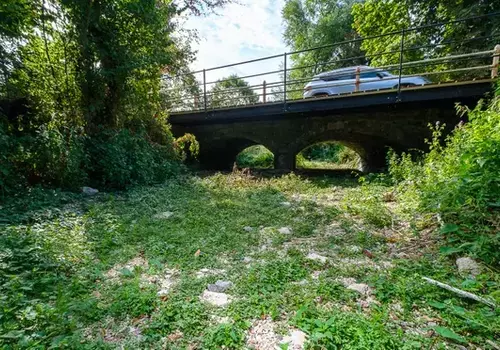

The dried up bed of the River Thames at Kemble in Gloucestershire.
<p>
The source of the River Thames has dried up and receded further downstream than ever before as England braces for an unprecedented&nbsp; drought.</p>
<p>
Britain&#39;s Meteorological Office has termed this July as the driest in England since 1935 with average rainfall, at 23.1 millimetres (0.9 inches) which works out to lees than one-third of the average for the month. Some parts of the UK saw the driest July ever.</p>
<p>
&quot;Following the prolonged dry weather, the source of the Thames in Gloucestershire has dried up, with a weak flow now only just about discernible more than five miles downstream&quot; Dr Rob Collins, director of policy and science at the Rivers Trust, told <a href="https://www.theguardian.com/environment/2022/aug/04/source-of-river-thames-dries-out-for-first-time-during-drought">The Guardian</a> newspaper.</p>
<p>
With the weather forecasters seeing no end in sight to the atypical heat, and warning that the extreme temperatures could become more common during the summer months, there&#39;s growing concern that the river may not return to its original source.</p>
<p>
This raises serious concerns as Thames provides fresh water to millions of homes and businesses across the most densely populated area of Britain.</p>
<p>
The River Thames stretches 356 kilometres across southern England, from Gloucestershire in the west through the heart of London, before entering the sea at Essex to the east.</p>
<p>
The natural spring that supplies the river, known as the source, dries up most summers. But this year the dry riverbed reaches significantly further downstream than in previous years, according to observations by conservation experts.</p>
<p>
A four-day &quot;extreme heat&quot; warning came into force in parts of England and Wales on Thursday. The Met Office issued its first such warning ever last month, when temperatures breached 40C (104F) for the first time, according to a Reuters report.</p>
<p>
Climate expert and hydrologist at the University of Reading Hannah Cloke said low rainfall has left river levels and aquifers low, while water has been taken out of the waterways to irrigate crops, top up drinking water and for use in industry.</p>
Leaders of the BRICS nations welcomed Indonesia as a member of the group, while 10…
External Affairs Minister S Jaishankar held a meeting with his Russian counterpart Sergey Lavrov on…
The Russian military has carried out a series of strikes on Ukrainian military-related targets in…
India's toy industry, once heavily dependent on imports, is now manufacturing domestically and exporting to…
Members of the Indian diaspora and several artists in Argentina welcomed Prime Minister Narendra Modi…
Sub Lieutenant Astha Poonia officially became the first woman to be streamed into the fighter…